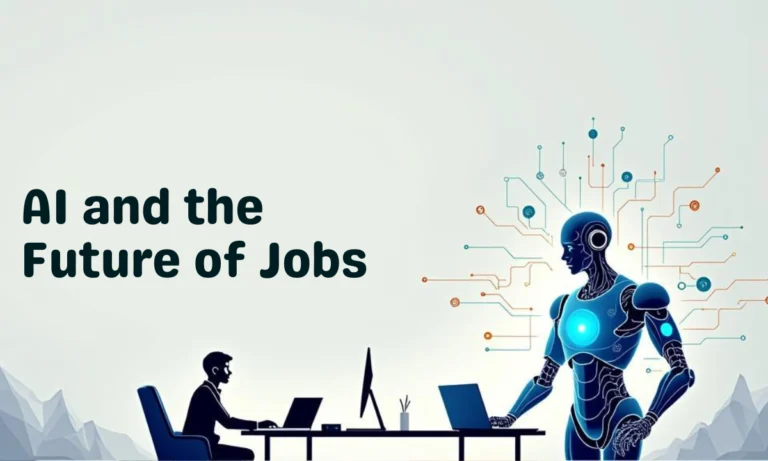If someone told you a decade ago that your phone would recognize your face, your watch could warn you about heart problems, and your fridge might suggest recipes, you’d probably laugh. But that’s exactly what Artificial Intelligence (AI) is doing today.
AI has quietly slipped into our routines — from binge-watching Netflix to asking Alexa to play music, from online shopping to fitness tracking. Let’s take a closer look at how AI shapes our daily lives, the benefits it brings, and the concerns we need to watch out for.

What Does “AI in Daily Life” Really Mean?
Artificial Intelligence sounds complicated, but at its core, it simply means teaching machines to “think” and act in ways that feel intelligent.
Every time your phone autocorrects a typo, Google Maps predicts the fastest route, or Spotify curates a playlist just for you, that’s AI at work. It’s not science fiction anymore — it’s the little helper running behind the scenes in almost everything we use.
Where Do We See AI Every Day?
AI isn’t limited to labs or tech companies; it’s sitting in your pocket, living room, and even your doctor’s office.
1. Smartphones and Voice Assistants
“Hey Siri, remind me to call Mom at 6.” — Simple, right? But for Siri (or Alexa, or Google Assistant), it’s a mini AI miracle.
From unlocking your phone with facial recognition to enhancing photos automatically, AI makes our smartphones smarter.
2. Entertainment & Streaming
Ever notice how Netflix knows the exact show you’ll want after finishing another? Or how YouTube suggests videos that match your mood?
AI studies your viewing habits, compares them with millions of others, and predicts what you’ll like next. It’s why binge-watching feels effortless.
3. Online Shopping
Shopping online isn’t just convenient — it’s AI-driven.
Amazon shows you products you didn’t even know you wanted.
Myntra suggests outfits based on your browsing.
Chatbots handle your questions 24/7.
The more you shop, the better AI gets at predicting your preferences.
4. Fitness and Healthcare
Your smartwatch buzzing to remind you to stand up? That’s AI looking after your health.
It tracks your heart rate, steps, and sleep.
Some even detect irregular heartbeats or stress levels.
Doctors are also using AI to analyze scans, discover drugs faster, and provide early diagnoses.
One of the most exciting applications of AI is in healthcare, where it’s improving diagnosis and patient care. Read our detailed guide on AI in Healthcare: Patient Care & Diagnosis.
5. Smart Homes
Imagine walking into your home and the lights adjust, the AC sets itself, and your coffee machine starts brewing — all without you lifting a finger.
Smart devices like Google Nest and Alexa-powered homes use AI to learn your routines and make your living space more comfortable and efficient.
Why AI Makes Life Better
Saves Time: From quick Google searches to voice commands.
Feels Personal: Tailored playlists, shopping suggestions, and news feeds.
Supports Decisions: AI analyzes data faster than we can.
Boosts Efficiency: Businesses save money, customers get better service.
The Flip Side: Concerns About AI
It’s not all sunshine. AI raises some important issues:
Privacy: Your data powers AI — but who owns that data?
Dependency: Are we relying too much on tech for simple tasks?
Ethics: Deepfakes, bias in algorithms, and job automation are big debates.
Transparency: Sometimes AI makes decisions we can’t fully understand.
What’s Next for AI in Everyday Life?
We’re only scratching the surface. The next wave of AI could mean:
Self-Driving Cars that make commuting safer.
AI Tutors giving personalized lessons to students.
Workplace AI Assistants handling reports, schedules, and communication.
Healthcare AI predicting illnesses before symptoms appear.
The future of AI isn’t about replacing humans — it’s about making us more capable.
Final Thoughts
AI has become a quiet partner in our lives — unlocking our phones, recommending our favorite shows, helping us shop, and even keeping us healthy. Like any tool, it comes with risks, but if used responsibly, it has the potential to make life smoother, smarter, and more enjoyable.
The key is balance: use AI as a helper, not a crutch. After all, the smartest combination is still humans + AI working together.
We’ve seen how AI changes daily life, but its role in healthcare is even more transformative. Discover more in our blog on AI in Healthcare
FAQs on AI in Everyday Life
1. How is AI used in daily life with examples?
AI is used in smartphones (face unlock, voice assistants), entertainment apps like Netflix and YouTube (personalized recommendations), online shopping (product suggestions, chatbots), healthcare (fitness trackers, medical scans), and smart homes (voice-controlled devices).
2. What are real world applications of artificial intelligence?
Real world AI applications include self-driving cars, fraud detection in banking, predictive healthcare, personalized learning in education, smart home automation, and AI-powered customer service chatbots.
3. What are the benefits of AI in daily life?
The key benefits of AI in daily life are:
Saving time with automation
Personalized experiences
Better decision-making with data analysis
Improved convenience and efficiency
4. What are the disadvantages of AI in everyday life?
Disadvantages include data privacy risks, over-dependence on technology, potential job automation, and ethical concerns such as bias in AI systems and deepfakes.
5. What is the future of AI in everyday life?
The future of AI includes autonomous vehicles, AI-powered education tools, workplace assistants for productivity, and healthcare AI that can predict diseases before symptoms appear.
AI is here to stay, but what does it mean for our careers and future skills? Discover how AI will transform jobs in our detailed guide on the Future of Work with AI.”






